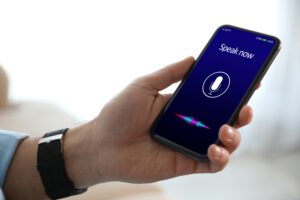We’ve researched some super interesting voice search statistics to give you the best insights into the voice search landscape in 2023, and even show why you should factor this into your SEO strategy, but before we jump in, let’s briefly break down the subject at hand.
It’s safe to say voice search has come a long way since the original ‘Audrey’ system was created back in 1952. Audrey was an ‘Automatic Digit Recognition’ machine built by Bell Laboratories that could recognise a digit with more than 90% accuracy – but only when it was spoken by the developer. She had less success with unfamiliar voices, but who doesn’t? Even in 2023, I’m convinced some of Siri’s responses to my questions are low-key mocking my northern accent!

At Embryo, we’re always keen to stay ahead of the curve when it comes to the latest digital marketing trends and technologies. To learn more about what we do and how we might be able to help your business stay at the forefront of your industry online, give us a call on 0161 327 2635 or email us at info@embryo.com.
What is Voice Search?
Voice search is exactly what it says on the tin – searching with your voice instead of typing (or tapping) the words into your search engine of choice. Voice search, or using a voice assistant, works using speech recognition technology to help you search the internet purely by saying out loud what you’re searching for.
Amazon Alexa, Siri on Apple devices and Google Assistant are all great examples of voice technology widely used in 2023, but there are many more voice search assistants we use regularly in our daily lives. These days you can use voice search to get instant answers across many digital devices and platforms, including your smartphone, desktop computers, TV, smart speakers, or even in your car!
Half a Dozen Standout Stats Before We Dive Into The Detail
- Digital voice assistants are predicted to hit 8.4 billion by 2024
- 64% of consumers make use of voice commands while driving
- Rev.ai tops the accuracy rating of speech-to-text tech companies with 86%
- 57% of users utilise voice search every day
- Almost 20% of voice search queries begin with just 25 different words
- 66% of consumers don’t have a smart speaker due to privacy concerns
30 of the Best Voice Search Stats for 2023

1. 57% of all voice search users utilise voice commands on a daily basis: In insights from the National Public Media’s Smart Audio Report, they found that more than half of people who use voice search or voice commands have made it part of their daily routine.
2. Around 75% of results from voice searches will rank in positions 1-3 on desktop: Research from 2020 found that three-quarters of voice search results for certain questions would rank in the top 3 positions in desktop search results.
3. 35% of US Citizens Own A Smart Speaker: As of 2022, a survey claimed that 35% of citizens in the United States owned a smart speaker, such as an Amazon Echo or Alexa, with 30% of Canadians being smart speaker owners. Australia comes up in a third place with 28%.
4. Experts predict 8.4 billion digital voice assistants by 2024: According to Statista, experts have forecast that 8.4 billion digital voice assistants will be in use across the world by 2024. This figure is higher than the world’s current population!
5. Rev.ai is the most accurate speech-to-text tech company with an 86% accuracy rate: Beating out big players like Amazon, Google and Microsoft, Rev.ai were found to have an 86% accuracy rating (meaning a 14% error rating) for their speech-to-text transcript technology in Statista data from 2021. Google came a close second with an 84% accuracy rating.
6. Voice search results take an average of 4.6 seconds to load: According to research from Backlinko where they reviewed 10,000 Google Home search results, it takes an average of 4.6 seconds to load voice search results. That’s actually 52% faster than a standard page!
7. Almost 40% of people who heard a voice ad went on to buy the item advertised: Recent research highlighted by Adobe gave some interesting insights into voice ads and their impact on the listener. The statistics showed that over a third of consumers who heard voice ads on smart speakers found them less intrusive than other types of ads (TV, online, etc.) and were actually more engaged than usual. This receptiveness to voice ads resulted in almost 40% of listeners going on to purchase the item being advertised.
8. Google’s voice recognition technology now supports 119 different language varieties: In a recent update from Google, they announced they’ve extended their speech recognition support for more languages from around the world than ever before – up to 119 varieties. You can even use voice dictation to add emojis in certain countries! They work with native speakers of the new languages they add and ask them to read common phrases so they can collect speech samples. This helps train their machine learning models to understand the sounds and improve the accuracy of the different languages for voice search over time.
9. 72% of users utilise voice search through their personal digital assistant: A recent Bing survey showed that almost three-quarters of respondents use voice search for their online searches through a personal digital assistant, such as Cortana, Siri, Alexa or Google Assistant.
10. E-commerce purchases are expected to rise by 400%: With smartphones and smart devices now present in most homes, the value of purchases made through voice assistants is expected to rise by 400% across the globe this year when compared with 2021. A total of 4.6 billion US dollars was spent on e-commerce purchases in 2021, with the expected total for 2023 set at 19.4 billion US dollars.
11. Almost 20% of voice search queries start with just 25 different words: Research from SEOClarity confirms that almost 20% of all voice search queries begin with a select group of 25 words, including adjectives like ‘easy’ or ‘best and question-based words such as ‘what’ or ‘how’.
12. Average of 23 words in voice search answers for local-intent queries: In a study by SEMrush in 2020, the average length of an answer returned by a voice assistant for a query with local intent was 23 words. These came up significantly longer for Google Home and Google Home Minis, potentially due to those devices having a screen.
13. 75% of US users ask voice search about the weather: A 2022 consumer report from Vixen Labs flagged the weather as one of the most popular voice search subjects. 75% of US users surveyed utilise voice search technology to find out whether sunny spells or rain clouds are on the way. The UK figure is 70%, with Germany slightly lower at 66%.
14. Answer match rate across Google Assistants is just 22%: Devices under the Google Assistant umbrella don’t seem to return the same local search results, despite having similar algorithms, according to a study by SEMrush. The answers matched just 22% of results across all Google devices. The most compatible seems to be the Google Home Hub and the Android smartphone despite their obvious differences, with an answer match rate of 66%.
15. UK Smart Speaker Users Prefer Alexa: According to stats from Statista, Amazon Alexa is the most popular smart speaker device in the UK, with a 46% share. Apple’s Siri and Google Assistant take a similar share of the voice recognition market, with 26% and 24% respectively.
16. 6.3% of local search questions left unanswered (on average): SEMrush recently analysed the top six devices with a voice search function to see how many questions couldn’t be answered. On average, this came out at 6.3% of questions asked. When their study was carried out in 2020, Amazon’s Alexa struggled to answer 23% of the questions asked. It would be interesting to know if that’s still the case!
17. 48% of UK consumers use voice to make a purchase: Voice shopping is now a thing, and apparently, we love it! Research from Vixen Labs confirms 48% of UK consumers used voice search to make a purchase in 2022, with the increasing popularity of voice search seeing this rise from 36% the previous year. 59% of consumers in the US used their voices to purchase items throughout 2022, with 52% of shoppers in Germany.
18. Voice search on mobile devices used by 27% of the global online population: Stats from Google claim mobile voice search is used by 27% of internet users worldwide.
19. 19% of UK users utilise voice search daily when out shopping: Voice assistant statistics from Vixen Labs claims 19% of UK shoppers use voice search in their everyday lives while out shopping. This shoots up to 27% in the US, with a slightly lower percentage in Germany than in the UK (17%).
20. 64% of users utilise voice commands while driving: Voice search stats from a recent survey by Perficient claims around 64% of the people surveyed used voice commands while they were driving. Their survey also suggests that just over half of respondents found using voice commands distracting during driving.
21. 16% of US users have been using voice search for 5+ years: UpCity’s research from 2022 shows 16% of users in the US have been utilising voice search technology for more than five years, with 33% claiming to have used it for between three and five years. 39% have been using voice assistance for between one and two years, with 12% only having used it in the previous year for the first time.
22. Over 40% of US Millennials use smart speakers: Data from eMarketer on the usage of voice assistants on smart speakers claims that 41.1% of Millennials in the US have adopted the use of smart speakers, with 34.5% of Gen X-ers and just 17.6% of Baby Boomers.
23. HTTPS websites make up over 70% of average voice search results pages: According to Backlinko, following their analysis of 10,000 Google Home pages, 70.4% of voice search results pages are secure HTTPS websites.
24. 52% of voice assistant users keep theirs in their living room: Google recently confirmed the top three locations for voice-activated speakers in the home. 52% of users keep theirs in their living room or family space, with 25% going for the bedroom and 22% choosing the kitchen.
25. 40.7% of voice search results come from a Featured Snippet: Backlinko’s recent study also showed that 40.7% of voice search answers come from a Featured Snippet, so it’s worth focusing on this as part of your SEO strategy in 2023 to help you rank for voice search.
26. 53% of smart speaker owners say they’re likely to respond to an ad: Key findings from the Smart Audio Report conducted by National Public Media claim that 53% of voice-activated speaker owners who heard an ad on their speaker said they were likely to respond to the ad.
27. 70% of smart home speaker owners are worried about privacy: According to The Case For Voice Control, a report by Hub Entertainment Research, 70% of smart speaker users say they have privacy concerns when using their voice-activated device.
28. More than half of US consumers order food deliveries through voice search: Voice search stats from Statista show 52% of US consumers use voice-activated search to order food for delivery, whilst that figure drops to 41% in the UK and 36% in Germany.
29. Over half of the consumers who use voice to shop also use it to research products: According to research by Narvar, 51% of those who use voice search to shop use it to research products before they purchase. 36% use voice devices to add to their shopping list, whilst 20% use them to provide reviews or product ratings.
30. 66% of consumers haven’t bought a smart speaker due to privacy concerns: Another interesting smart speaker statistic from Hub’s recent report cited privacy as the main reason why 66% of consumers are yet to purchase one.
Voice Search Is Here to Stay – It’s Time to Align Your SEO Strategy

Whether it’s through a smart speaker, personal digital assistant or through our mobile phones, voice search features can be found in almost all of our tech these days. As the majority of these voice search statistics show, the adoption of voice-assisted search is growing every day – with voice search trends ranging from online shopping at grocery stores to finding tickets for upcoming events, and researching beauty products to looking for local business listings – so now’s the time to optimise your content for Voice SEO to ensure you’re showing up for your customers when they need you.
The experts here at Embryo have worked with numerous businesses over the years, both big and small, to help their digital presence be the best it can be. If you need help with your organic traffic, paid leads (PPC), social media or digital PR, get in touch with Embryo today to see how we can assist you in exceeding your aspirations.













